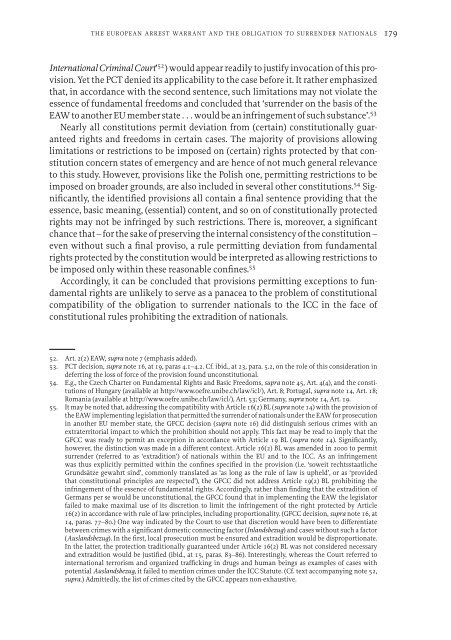Lessons of the European Arrest Warrant for Domestic ...
Lessons of the European Arrest Warrant for Domestic ...
Lessons of the European Arrest Warrant for Domestic ...
Create successful ePaper yourself
Turn your PDF publications into a flip-book with our unique Google optimized e-Paper software.
THE EUROPEAN ARREST WARRANT AND THE OBLIGATION TO SURRENDER NATIONALS 179International Criminal Court’ 52 ) would appear readily to justify invocation <strong>of</strong> this provision.Yet <strong>the</strong> PCT denied its applicability to <strong>the</strong> case be<strong>for</strong>e it. It ra<strong>the</strong>r emphasizedthat, in accordance with <strong>the</strong> second sentence, such limitations may not violate <strong>the</strong>essence <strong>of</strong> fundamental freedoms and concluded that ‘surrender on <strong>the</strong> basis <strong>of</strong> <strong>the</strong>EAW to ano<strong>the</strong>r EU member state ...would be an infringement <strong>of</strong> such substance’. 53Nearly all constitutions permit deviation from (certain) constitutionally guaranteedrights and freedoms in certain cases. The majority <strong>of</strong> provisions allowinglimitations or restrictions to be imposed on (certain) rights protected by that constitutionconcern states <strong>of</strong> emergency and are hence <strong>of</strong> not much general relevanceto this study. However, provisions like <strong>the</strong> Polish one, permitting restrictions to beimposed on broader grounds, are also included in several o<strong>the</strong>r constitutions. 54 Significantly,<strong>the</strong> identified provisions all contain a final sentence providing that <strong>the</strong>essence, basic meaning, (essential) content, and so on <strong>of</strong> constitutionally protectedrights may not be infringed by such restrictions. There is, moreover, a significantchance that – <strong>for</strong> <strong>the</strong> sake <strong>of</strong> preserving <strong>the</strong> internal consistency <strong>of</strong> <strong>the</strong> constitution –even without such a final proviso, a rule permitting deviation from fundamentalrights protected by <strong>the</strong> constitution would be interpreted as allowing restrictions tobe imposed only within <strong>the</strong>se reasonable confines. 55Accordingly, it can be concluded that provisions permitting exceptions to fundamentalrights are unlikely to serve as a panacea to <strong>the</strong> problem <strong>of</strong> constitutionalcompatibility <strong>of</strong> <strong>the</strong> obligation to surrender nationals to <strong>the</strong> ICC in <strong>the</strong> face <strong>of</strong>constitutional rules prohibiting <strong>the</strong> extradition <strong>of</strong> nationals.52. Art. 2(2) EAW, supra note 7 (emphasis added).53. PCT decision, supra note 16, at 19, paras 4.1–4.2. Cf. ibid., at 23, para. 5.2, on <strong>the</strong> role <strong>of</strong> this consideration indeferring <strong>the</strong> loss <strong>of</strong> <strong>for</strong>ce <strong>of</strong> <strong>the</strong> provision found unconstitutional.54. E.g., <strong>the</strong> Czech Charter on Fundamental Rights and Basic Freedoms, supra note 45, Art. 4(4), and <strong>the</strong> constitutions<strong>of</strong> Hungary (available at http://www.oefre.unibe.ch/law/icl/), Art. 8; Portugal, supra note 14, Art. 18;Romania (available at http://www.oefre.unibe.ch/law/icl/), Art. 53; Germany, supra note 14, Art. 19.55. It may be noted that, addressing <strong>the</strong> compatibility with Article 16(2) BL (supra note 14) with <strong>the</strong> provision <strong>of</strong><strong>the</strong> EAW implementing legislation that permitted <strong>the</strong> surrender <strong>of</strong> nationals under <strong>the</strong> EAW <strong>for</strong> prosecutionin ano<strong>the</strong>r EU member state, <strong>the</strong> GFCC decision (supra note 16) did distinguish serious crimes with anextraterritorial impact to which <strong>the</strong> prohibition should not apply. This fact may be read to imply that <strong>the</strong>GFCC was ready to permit an exception in accordance with Article 19 BL (supra note 14). Significantly,however, <strong>the</strong> distinction was made in a different context. Article 16(2) BL was amended in 2000 to permitsurrender (referred to as ‘extradition’) <strong>of</strong> nationals within <strong>the</strong> EU and to <strong>the</strong> ICC. As an infringementwas thus explicitly permitted within <strong>the</strong> confines specified in <strong>the</strong> provision (i.e. ‘soweit rechtsstaatlicheGrundsatze ¨ gewahrt sind’, commonly translated as ‘as long as <strong>the</strong> rule <strong>of</strong> law is upheld’, or as ‘providedthat constitutional principles are respected’), <strong>the</strong> GFCC did not address Article 19(2) BL prohibiting <strong>the</strong>infringement <strong>of</strong> <strong>the</strong> essence <strong>of</strong> fundamental rights. Accordingly, ra<strong>the</strong>r than finding that <strong>the</strong> extradition <strong>of</strong>Germans per se would be unconstitutional, <strong>the</strong> GFCC found that in implementing <strong>the</strong> EAW <strong>the</strong> legislatorfailed to make maximal use <strong>of</strong> its discretion to limit <strong>the</strong> infringement <strong>of</strong> <strong>the</strong> right protected by Article16(2) in accordance with rule <strong>of</strong> law principles, including proportionality. (GFCC decision, supra note 16, at14, paras. 77–80.) One way indicated by <strong>the</strong> Court to use that discretion would have been to differentiatebetween crimes with a significant domestic connecting factor (Inlandsbezug) and cases without such a factor(Auslandsbezug). In <strong>the</strong> first, local prosecution must be ensured and extradition would be disproportionate.In <strong>the</strong> latter, <strong>the</strong> protection traditionally guaranteed under Article 16(2) BL was not considered necessaryand extradition would be justified (ibid., at 15, paras. 83–86). Interestingly, whereas <strong>the</strong> Court referred tointernational terrorism and organized trafficking in drugs and human beings as examples <strong>of</strong> cases withpotential Auslandsbezug, it failed to mention crimes under <strong>the</strong> ICC Statute. (Cf. text accompanying note 52,supra.) Admittedly, <strong>the</strong> list <strong>of</strong> crimes cited by <strong>the</strong> GFCC appears non-exhaustive.
















